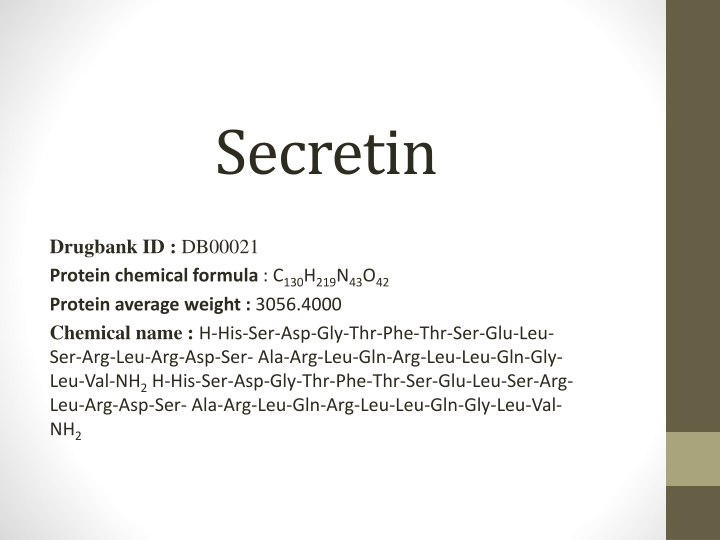
Synthetic Secretin: Uses, Mechanism of Action, and Drug Interactions
Synthetic secretin, a peptide hormone, is used for diagnosing pancreatic dysfunction and stomach cancer. It regulates small intestine pH by controlling gastric acid secretion and bicarbonate buffering. Learn about its mechanism of action and interactions with other drugs.
Download Presentation

Please find below an Image/Link to download the presentation.
The content on the website is provided AS IS for your information and personal use only. It may not be sold, licensed, or shared on other websites without obtaining consent from the author. If you encounter any issues during the download, it is possible that the publisher has removed the file from their server.
You are allowed to download the files provided on this website for personal or commercial use, subject to the condition that they are used lawfully. All files are the property of their respective owners.
The content on the website is provided AS IS for your information and personal use only. It may not be sold, licensed, or shared on other websites without obtaining consent from the author.
E N D
Presentation Transcript
Secretin Drugbank ID : DB00021 Protein chemical formula : C130H219N43O42 Protein average weight : 3056.4000 Chemical name : H-His-Ser-Asp-Gly-Thr-Phe-Thr-Ser-Glu-Leu- Ser-Arg-Leu-Arg-Asp-Ser- Ala-Arg-Leu-Gln-Arg-Leu-Leu-Gln-Gly- Leu-Val-NH2H-His-Ser-Asp-Gly-Thr-Phe-Thr-Ser-Glu-Leu-Ser-Arg- Leu-Arg-Asp-Ser- Ala-Arg-Leu-Gln-Arg-Leu-Leu-Gln-Gly-Leu-Val- NH2
Description : This drug is the synthetic form of natural secretin. It is prepared using solid phase peptide synthesis. Secretin is a peptide hormone produced in the S cells of the duodenum. Its main effect is to regulate the pH of the small intestine through the control of gastric acid secretion and buffering with bicarbonate. It was the first hormone to be discovered. s contents Indication : For diagnosis of pancreatic exocrine dysfunction and gastrinoma Pharmacodynamics : Used in the diagnosis of pancreatic dysfunction or gastrinoma (stomach cancer), secretin is a hormone produced in the S cells of the duodenum in response to low local pH. It stimulates the secretion of bicarbonate from bicarbonate producing organs(liver, pancreas, Brunner's glands) when the pH drops below a set value. This helps neutralize the gastric acid entering the duodenum from the stomach. It also inhibits acid secretion from the stomach by reducing gastrin release from the G cells of the stomach.
Mechanism of action : Secretin binds to the secretin receptor found on the lining of S cells in the duodenum and G cells in the stomach. Binding leads to the secrection of bicarbonate or the reduction of the secretion of gastrin. Properly functioning organs (duodenum, pancreas and stomach) should be responsive to this hormone
DRUG INTERACTION: Clidinium: anticholinergic agents such as secretin may diminish the stimulatory effect of secretin. Avoid using drugs with substantial anticholinergic effects in patients receiving secretin whenever possible. If such agents must be used in combination, monitor response to secretin closely. Tiotropium: the stimulatory effect of secretin may be reduced by anticholinergicssuch as tiotropium. Concomitant use of secretin and drugs with substantial anticholinergic effects should be avoided. If combination therapy must be used, secretin efficacy should be closely monitored .Tolterodine: the stimulatory effect of secretin may be reduced by anticholinergicssuch as tolterodine. Concomitant use of secretin and drugs with substantial anticholinergic effects should be avoided. If combination therapy must be used, secretin efficacy should be closely monitored. Trihexyphenidyl: the stimulatory effect of secretin may be reduced by anticholinergicssuch as trihexyphenidyl. Concomitant use of secretin and drugs with substantial anticholinergic effects should be avoided. If combination therapy must be used, secretin efficacy should be closely monitored. Trimethobenzamide: the stimulatory effect of secretin may be reduced by anticholinergicssuch as trimethobenzamide. Concomitant use of secretin and drugs with substantial anticholinergic effects should be avoided. If combination therapy must be used, secretin efficacy should be closely monitored.
Trospium : the stimulatory effect of secretin may be reduced by anticholinergics such as trospium. Concomitant use of secretin and drugs with substantial anticholinergic effects should be avoided. If combination therapy must be used, secretin efficacy should be closely monitored. Targets : Secretin receptor Affected organisms : Humans and other mammals . Categories : Diagnostic Agents Sequence : HSDGTFTSELSRLRDSARLQRLLQGLV
Brands : SecreFlo Company : Repligen Corp Description : SecreFlo lyophilized white cake powder acetate salt of secretin, a peptide hormone. Secretin has an amino acid sequence identical to the naturally occurring porcine secretin consisting of 27 amino acids. Used for/Prescribed for : SecreFlo (secretin) is indicated for use in secretin stimulation testing for: 1) Stimulation of pancreatic secretions, including bicarbonate, to aid in the diagnosis of pancreatic exocrine dysfunction. 2) Stimulation of gastrin secretion to aid in the diagnosis of gastrinoma. 3) Stimulation of pancreatic secretions to facilitate the identification of the ampulla of Vater and accessory papilla during endoscopic retrograde cholangiopancreatography (ERCP). Formulation : SecreFlo contains 16 mcg of purified secretin, 15 mg of L- cysteine hydrochloride, and 20 mg of mannitol per vial. Form : lyophilized white powder Route of administration : intravenous injection (secretin) is a pure sterile, nonpyrogenic,
Contraindication : allergy Side effects : Abdominal discomfort Nausea Mild bradycardia(reduced heart rate) Decreased blood pressure Diaphoresis (profuse perspiration) Drug interaction : The concomitant use of anticholinergicagents may make patients hyporesponsive, i.e. may produce a false positive result.
References: http://www.medilexicon.com/drugs/secreflo.php http://www.rxlist.com/secreflo-drug.htm
